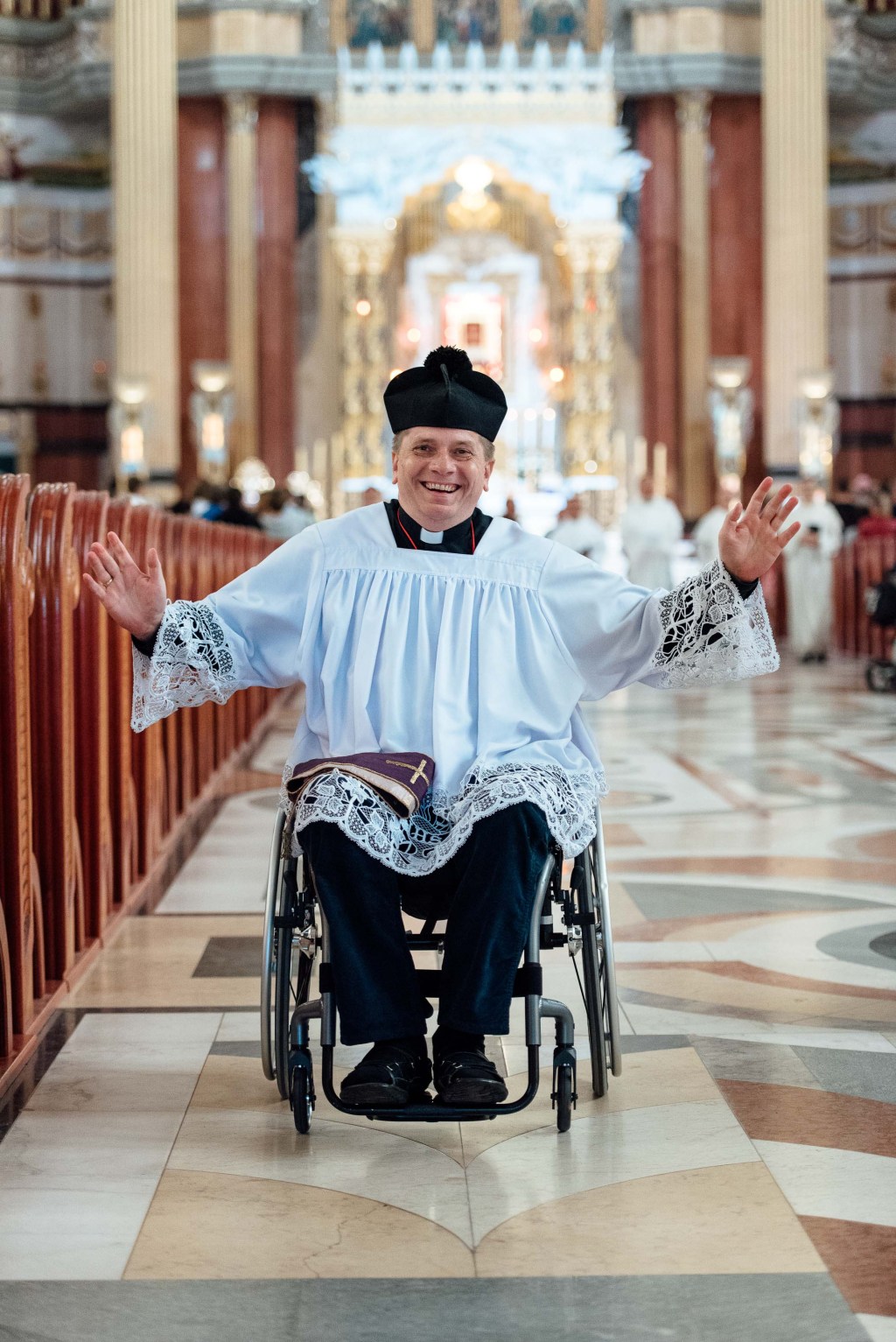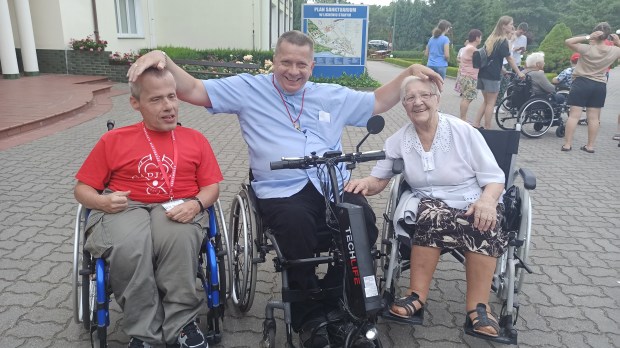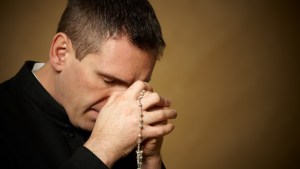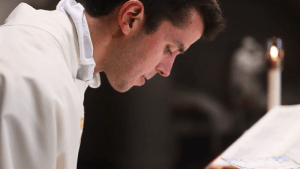In technical school, he was the “king of discos,” but eventually he chose God.
As a seminarian, he took care of people with disabilities. He went to meetings and retreats with them, talked about life, and above all, never passed by indifferently in the face of their suffering. Then at the age of 33, his life changed dramatically: after a car accident, he ended up in a wheelchair himself.
“One of the first things I said to God was to thank him for leaving me with functioning hands and a head, which is what is most important in the priesthood,” Fr. Marek Balwas tells Aleteia.
As he rides up in front of the altar in a wheelchair, silence falls. The young people for whom he often leads retreats look at him with interest. They think, “We’ll give him a chance, it looks like he won’t poison us.” “I’m not trying to pretend to be someone else. Everyone has a choice in their lives, just not everyone knows it,” explains the clergyman.
Priest on wheels
Fr. Marek Balwas calls himself “God’s donkey on wheels” because, he says, he brings Jesus to people. He lives in a house for priests in Ciechocinek from where he travels all over Poland preaching retreats and meeting with young people, talking to them and sharing his unusual experiences.
No one would have guessed that such a feisty young man, who was at one point the “king of discos,” would come to choose the priesthood. He’d been an altar boy since the age of eight. In the last grade of elementary school he obtained a grade point average of 4.3. He could have gone to high school, but decided on a vocational school instead. “There you didn’t have to study so much,” he says, explaining the decision he made years ago.
However, he quickly realized that a degree as a mechanical locksmith would not help him realize his plans for the future. So he continued his studies at an evening technical school, which allowed him to work during the day. He would get up every day at five in the morning and go to work in a lignite mine, and in the afternoon he went to school. Every Wednesday he would go wild on the dance floor at the local disco.
When he was 15, he helped build the basilica of Our Lady of Licheń. There he met seminarians who ministered to people with disabilities. “I thought I’d like that too, but then I’d have to become a priest,” he says.
His enthusiasm for the priesthood was cooled by the advice of the vicar serving in his home parish. He suggested that before making such an important decision he should first finish technical school, get a full-time job, or even fall in love. According to this priest, you can only choose well if you are fully aware of what you will give up.
“I told the Savior: ‘Lord Jesus, I know that in order to be a priest I must graduate,’ and by some miracle … I passed,” Fr. Marek Balwas tells us.
He also explains that all the valuable experiences he has gained have shown him that God is the most important thing in his life. He received his priestly formation at the major seminary in Wloclawek. The devil tempted him with doubts, so he burned his notebook with addresses and phone numbers. He asked God to enable him to be a good priest, not to seek himself, but to know how to give Jesus to people.

“For salvation you don’t need legs, but a heart”
During his first year, he received an offer to participate in meetings for people with disabilities.
“I agreed without hesitation. At the end of the academic year, I decided to go on a summer trip with the disabled, to Gdynia. Taking care of the disabled was a dream come true for me after many years since my memorable stay in Licheń. With these sick people, we had to do everything: from dressing and washing them, to taking them to meals, feeding them, or going for a walk. We prayed, played, and talked with them. We experienced sorrows and joys together, sharing doubts as well. I remember this as a beautiful time, because it was spent helping other people,” says Fr. Marek.
He also admits that it was people with disabilities who taught him to pray, live, and appreciate the things we have at our disposal, which we often don’t even realize.
“Many of these people never walked, and couldn’t ever dress or eat on their own. They had malfunctioning hands, were blind, or moved around in a wheelchair. My heart broke into pieces as I watched this human suffering. I remember asking God at the time why he allows this,” the priest explained. The answer came from the suffering people themselves. It was hard not to notice how they were able to enjoy life, and they were grateful for every sign of human kindness and cordiality.
“I remember one beautiful sunny day we went to the beach, and I took a boy in a wheelchair with me. We drove onto the beach, and I transported him from the wheelchair to a blanket where he could sit down. When he admitted to me that he had never been in the sea, I immediately took him in my arms and we went into the water. He touched the seawater with his hands, then his mouth, and exclaimed: ‘Salty indeed!’” Fr. Marek recounts. Afterwards, he adds, “I was glad he was able to experience it, because shortly after that trip he fell ill with sepsis and died.”
The car accident
When he was 33, as a result of a car accident he fractured his spine and suffered a spinal cord injury on the T4 vertebra. Since then, he has also been in a wheelchair himself.
“When I recovered from the tragic accident and learned that I wouldn’t be able to walk, surprisingly it didn’t shock me too much. Maybe it was precisely because I had been in contact with wheelchair users before. I thought at the time, ‘It’s hard, but apparently this is how it’s supposed to be. The Lord God probably has a plan in this.’ I gave thanks that he had left me with functioning hands and head, which is what’s most important for the priesthood,” he explains.
“I can celebrate the Eucharist, administer the sacrament of reconciliation, and preach. Recently, at a retreat I led for young people, I learned – just from the young people – that ‘with your feet you cannot save yourself, only with your heart.’ This truth is enlightening me more and more. After all, legs aren’t the most important thing. Much more important is full trust in God’s plan, with the heart,” he adds.
“I realized that the Lord God, in directing me a few years ago to accompany people with disabilities, was slowly preparing me for my destiny,” the clergyman explains.
The priest has an amazing approach to young people. On online forums, young people talk about his golden heart, as well as the fact that he never reads from a page when he preaches and yet conveys deep meaning in his message. The fact that he uses a wheelchair causes listeners to come more often and in greater numbers to the retreats he runs.
“I organized and led retreats for people with disabilities in Licheń. I also participated in the Wloclawek Walking Pilgrimage to Jasna Gora. What helps me live is prayer and a smile. In prayer I stand before God as I am, without pretense, often with tears in my eyes. Only God knows the pain and suffering I experience, opening my eyes and waiting for that blessed moment when the day will end. However, in spite of the sadness and maybe also a little sorrow before God, I am smiling!” says Fr. Marek Balwas.
Nothing is impossible for God
The priest has sometimes seen pity in other peoples’ eyes. He admits that he doesn’t like it, and that he doesn’t seek sympathy from others. He celebrates Mass in his home chapel, evangelizes on radio stations, and travels wherever he is needed. He always finds time to talk.
The clergyman remembers how one day a young man came to him who asked for confession and said that he wanted to commit suicide later. “He confessed that he had promised his grandmother that if he ever wanted to do something to himself, he would go to confession first,” recalls Fr. Marek Balwas. The priest instructed him to go for a long walk and reflect on his life. “As soon as he left, I grabbed the rosary and asked Mary to make him still come back to me here, so that he wouldn’t do something bad to himself along the way.” The young man returned to tell him his story.
“It turned out that when he got out of prison, his fiancée left him for another man, causing him to lose the meaning of his life. So I asked him to return to his hometown, find a job and put his life back together. I also gave him money for a ticket. He called a month later saying that he had found a job and wanted to return the money for the ticket. I just asked him to pray for me,” Fr. Marek recalled.
“Let’s not blame God for evil,” he added.
“It is beyond imagining how Satan can mess up a human life. The most important thing is not to let him take away our desire to live. In many cases, we ourselves are responsible for the mess in our lives,” he stresses.
Rev. Marek explains that the hardest thing is to follow Jesus consistently, no matter what. He adds, however, that after all, only such a life – in relationship with Him – makes sense. “Nothing is impossible for God. People think that things are already so hopeless in their lives that nothing good will ever happen to them again. But there’s always a way out, especially for a believer who wants to change something in his life,” says the priest.
“We have to take care so as not to miss the good among the hardships of everyday life. There’s always a chance to convert, to start a new life. God’s plans are strange and mysterious. I bless from the heart everyone reading this text,” he adds.



